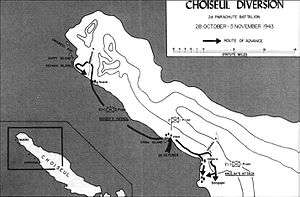Raid on Choiseul
| Raid on Choiseul | |||||||
|---|---|---|---|---|---|---|---|
| Part of the Pacific Theater of World War II | |||||||
 A map of the raid on Choeiseul | |||||||
| |||||||
| Belligerents | |||||||
|
|
| ||||||
| Commanders and leaders | |||||||
| Victor H. Krulak | Minoru Sasaki[1] | ||||||
| Strength | |||||||
| 750[2] | 3,000-7,000[3] | ||||||
| Casualties and losses | |||||||
| 13 killed[4][5] |
143 killed, two barges sunk[4] | ||||||
The Raid on Choiseul was a small unit engagement that occurred from October 28 to November 3, 1943, during the Solomon Islands campaign. United States Marines from the 2nd Parachute Battalion, led by Lt Col. Victor "Brute" Krulak, landed on Japanese occupied Choiseul in the northern Solomon Islands and carried out raids on Japanese army and navy forces over a 40 kilometer (25 mi) area over the course of seven days.
The raid was meant to divert Japanese attention from the planned Allied landings on the west coast of Bougainville at Empress Augusta Bay. Instead, the Allies hoped that the raid would cause the Japanese to believe the landings would be on the east side of Bougainville.
During the course of the operation, Krulak's 650 man battalion, assisted by an Australian coastwatcher and native Choiseul islanders, killed 143 Japanese troops, losing 14 Marines (12 killed in action, two missing), in actions later described by Major General Roy Geiger as, "a series of short right jabs designed to throw the enemy off balance and conceal the real power of the left hook to his midriff at Empress Augusta Bay."[6]
On November 2, the raid was momentarily stalled when a Japanese ambush trapped between 40 and 50 marines. Three marines were severely wounded, one of them fatally. The marines were rescued by the motor torpedo boat PT-59, under the command of Lieutenant John F. Kennedy.[7]
The ultimate impact of the raid on the Japanese response to the Allied Bougainville landings is unclear. Some historians assert that the raid was successful at diverting Japanese attention while other historians take a contrary position.
Notes
- ↑ Fuller, Shokan, p. 190. Sasaki was present and in command of the Japanese Army forces on Choiseul from October 6, 1943 until sometime in November, 1943 when he moved to Rabaul.
- ↑ Gailey, Bougainville, p. 59
- ↑ Gailey, Bougainville, p. 47 and Fuller, Shokan, p. 190. Most of the Japanese Army troops on Choiseul were evacuating from New Georgia, Arundel, and Kolombangara islands and using Choiseul as a transit point to go to Bougainville and New Britain. The exact number of Japanese troops on Choiseul at the time of the raid is unknown.
- 1 2 Gailey, Bougainville, p. 58.
- ↑ Gives USMC casualties as 9 KIA/15 Wounded/2 MIA declared dead
- ↑ Sherrod, Robert (1952). ‘’”History of Marine Corps Aviation in World War II.’’ p. 181. Combat Forces Press.
- ↑ Donovan, Robert J. PT-109: John F. Kennedy in WW II, pp 176-184.
References
- Christ, James F. (2006). Mission Raise Hell: The U.S. Marines on Choiseul, October-November 1943. Annapolis, MD, USA: Naval Institute Press. ISBN 1-59114-113-3.
- Donovan, Robert J. (2001). PT 109: John F. Kennedy in WWII, 40th Anniversary Edition, McGraw Hill (reprint), ISBN 0-07-137643-7.
- Feldt, Eric Augustus (1991) [1946]. The Coastwatchers. Victoria, Australia: Penguin Books. ISBN 0-14-014926-0.
- Fuller, Richard (1992). Shokan: Hirohito's Samurai. London: Arms and Armour Press. ISBN 1-85409-151-4.
- Gailey, Harry A. (1991). "The Treasuries and Choiseul". Bougainville, 1943-1945: The Forgotten Campaign. Lexington, Kentucky, USA: University Press of Kentucky. ISBN 0-8131-9047-9.- neutral review of this book here:
- Lord, Walter (2006) [1977]. Lonely Vigil; Coastwatchers of the Solomons. New York: Naval Institute Press. ISBN 1-59114-466-3.
- McGee, William L. (2002). "Bougainville Campaign". The Solomons Campaigns, 1942-1943: From Guadalcanal to Bougainville--Pacific War Turning Point, Volume 2 (Amphibious Operations in the South Pacific in WWII). BMC Publications. ISBN 0-9701678-7-3.
- Morison, Samuel Eliot (1958). Breaking the Bismarcks Barrier, vol. 6 of History of United States Naval Operations in World War II. Castle Books. ISBN 0-7858-1307-1.
External links
- Chapin, John C. (1997). "TOP OF THE LADDER: Marine Operations in the Northern Solomons". World War II Commemorative series. Marine Corps History and Museums Division. p. 1. Retrieved August 30, 2006. Also available at:
- Hoffman, Jon T. "SILK CHUTES AND HARD FIGHTING: US. Marine Corps Parachute Units in World War II: Choiseul". Commemorative series. Marine Corps History and Museums Division. p. 1. Retrieved May 30, 2006.
- Fuquea, David C. (1997). "Bougainville: The Amphibious Assault Enters Maturity". Naval War College Review, Vol. L, No. 1. Retrieved May 30, 2006.
- Miller, John, Jr. (1959). "CARTWHEEL: The Reduction of Rabaul". United States Army in World War II: The War in the Pacific. Office of the Chief of Military History, U.S. Department of the Army. p. 418. Retrieved October 20, 2006.
- Rentz, John M. (1946). "Bougainville and the Northern Solomons". USMC Historical Monograph. Historical Branch, Headquarters, U.S. Marine Corps. Retrieved October 18, 2006.
- Shaw, Henry I.; Douglas T. Kane (1963). "Volume II: Isolation of Rabaul". History of U.S. Marine Corps Operations in World War II. Retrieved 2006-10-18.
- Hove, Duane T. (2003). "American Warriors: Five Presidents in the Pacific Theater of World War II". Burd Street Press. Retrieved August 2007. Check date values in:
|access-date=(help)